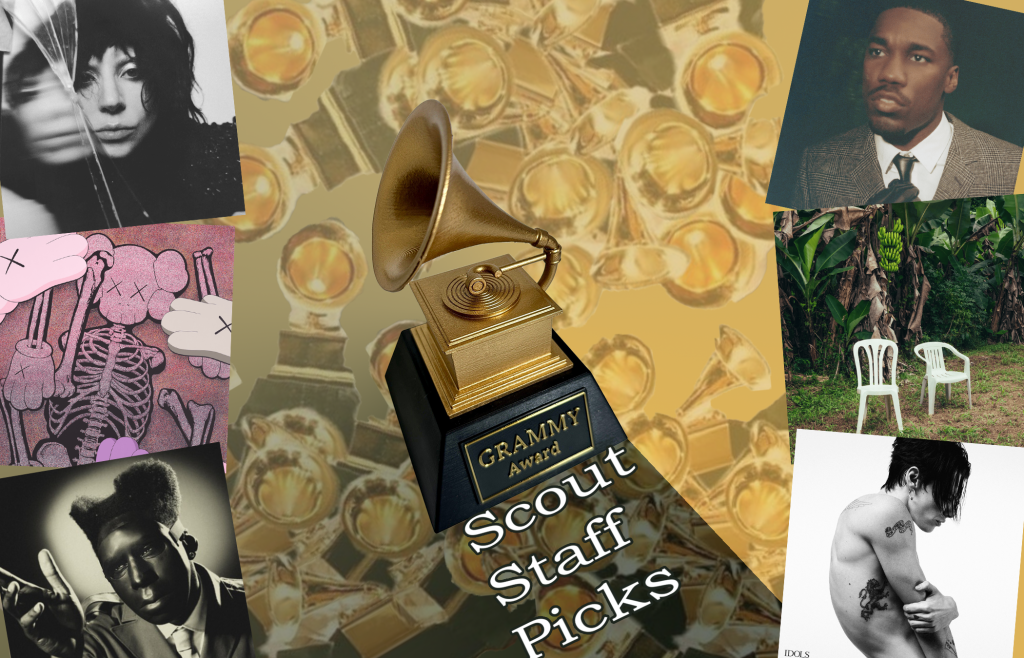
With the announcement of the Grammy nominations on Nov. 7, The Scout staff has selected its favorite nominated albums across all categories.
Rome Tews:
“MAYHEM” by Lady Gaga
It had to be done. “MAYHEM” is another culture-defining moment for Lady Gaga, recapturing her recession-core pop feeling of “The Fame.” The power of the singles, “Disease” and “Abracadabra” being nominated for Best Pop Solo Performance and Record/Song of the Year, respectively, her collaboration with Bruno Mars “Die With a Smile,” which was nominated last year and maintains 3 billion Spotify streams. The absolute gagfest that is The MAYHEM Ball tour shows Gaga’s strength: turning music into a universe. Up for seven total categories and Gaga’s fifth Album of the Year nomination, all the little monsters hope “MAYHEM” can bring home some gold.
Latif Love:
“BELOVED” by Giveon
To be honest, I either haven’t listened to or don’t enjoy many of the other Grammy-nominated albums this year, so “BELOVED” wins by default. Giveon fans were starving for another album after “Give Or Take” in 2022, and it’s safe to say it was worth the wait. Giveon only gets inspired to make music when something happens in his life. This time, it was a breakup, and I hate to say it, but he may need to go through a few more if this is the result. “BELOVED” is a perfect encapsulation of the enthralls of dating in your 20s and the lasting effects on your life.
Scarlett Rose Binder:
“Idols” by YUNGBLUD
Let’s be real: Lady Gaga’s “MAYHEM” was the best album of the year. I knew it would be given its flowers. However, I was pleasantly surprised to see a nomination for YUNGBLUD’s “Idols.” While Gaga’s work is bound for fame, YUNGBLUD rarely gets the credit he undoubtedly deserves. You can hear the heart and soul he puts into his music. This album is just his latest work of art. With the first single alone – “Hello Heaven, Hello” – the rock star accomplished the unimaginable; he created a more than nine-minute-long song that I am at no point tempted to skip. The rest of the album is more of the same, though the other tracks are much shorter. “Idols” is full of passion and grit and deserves recognition.
Paul Swartz:
“Let God Sort Em Out” by Clipse
In July, brothers Pusha T and Malice released their first album as Clipse in 16 years. If there has ever been an album worth that wait, this was it. “Let God Sort Em Out” is flawless from start to finish. Pharrell Williams’ production is as good as it’s ever been, bouncing between operatic strings and grimy boom-bap beats. The guest appearances from Tyler, the Creator, Kendrick Lamar, Nas, John Legend, Ab-Liva and more are all perfectly placed. Pusha T has established himself as one of the genre’s premier lyricists throughout his solo catalogue, but Malice out-raps his brother on several occasions. From the intensely emotional “The Birds Don’t Sing” to the braggadocious “So Be It” to the reflective “By The Grace Of God,” Clipse gave us one of the best albums of the year, and the best album nominated at the Grammys.
Jordan Jones:
“Chromakopia” by Tyler, The Creator
Tyler, The Creator’s “Chromakopia” is an experience. Every track feels like stepping into a new color of his mind, blending a variety of different sounds into something that’s both nostalgic and futuristic. It’s one of the most daring and cohesive projects being represented at the Grammys this year, proving Tyler still has the power to rewrite what alternative-rap can sound like.
Nikko Wotherspoon:
“Debí Tirar Más Fotos” by Bad Bunny
Bad Bunny is no stranger to releasing fire albums, and this is definitely one of them. The album feels like a reflection of Bad Bunny’s roots and Puerto Rican identity in a way that’s both specific and universal. He draws on elements from multiple genres in his homeland, such as reggaetón and salsa, making the album feel fresh and genuine. What makes this a Grammy-worthy album is the experimentation and risks he takes with his style while connecting with millions of listeners. He is pushing his style and Latin music as a whole into new territory and proving Spanish-language albums can be just as innovative and culturally important as its non-English counterparts.

